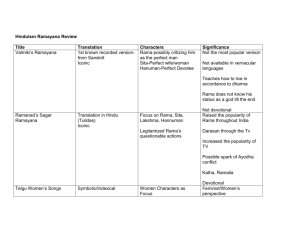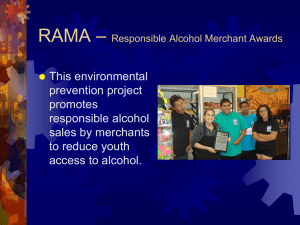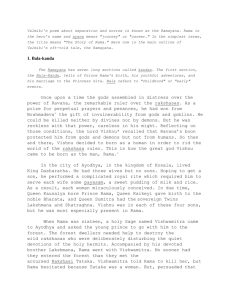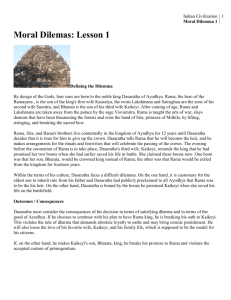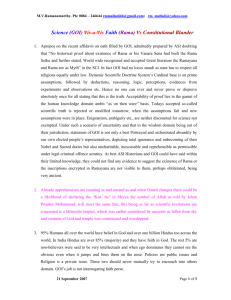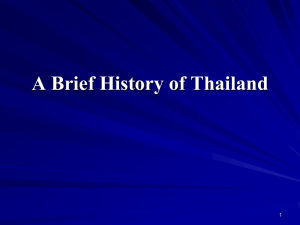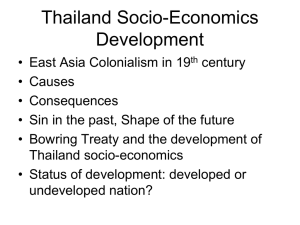VALMIKI RAMAYANA By Dr. Saroja Ramanujam, M.A.,Ph.D
advertisement
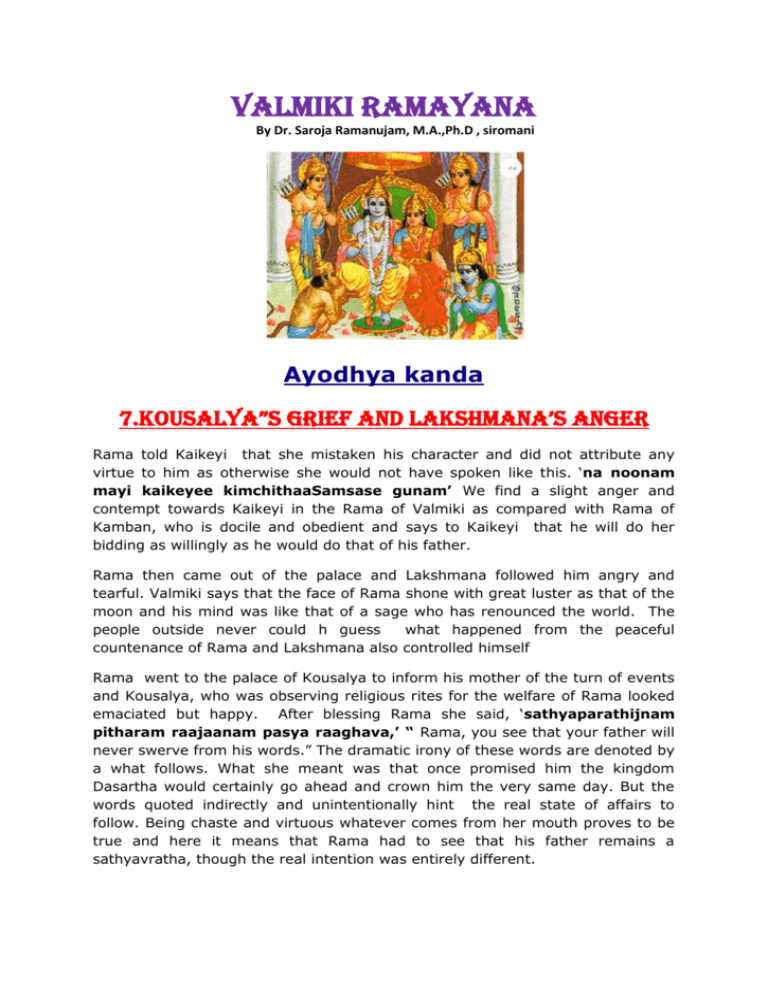
VALMIKI RAMAYANA By Dr. Saroja Ramanujam, M.A.,Ph.D , siromani Ayodhya kanda 7.Kousalya”s grief and laKshmana’s anger Rama told Kaikeyi that she mistaken his character and did not attribute any virtue to him as otherwise she would not have spoken like this. ‘na noonam mayi kaikeyee kimchithaaSamsase gunam’ We find a slight anger and contempt towards Kaikeyi in the Rama of Valmiki as compared with Rama of Kamban, who is docile and obedient and says to Kaikeyi that he will do her bidding as willingly as he would do that of his father. Rama then came out of the palace and Lakshmana followed him angry and tearful. Valmiki says that the face of Rama shone with great luster as that of the moon and his mind was like that of a sage who has renounced the world. The people outside never could h guess what happened from the peaceful countenance of Rama and Lakshmana also controlled himself Rama went to the palace of Kousalya to inform his mother of the turn of events and Kousalya, who was observing religious rites for the welfare of Rama looked emaciated but happy. After blessing Rama she said, ‘sathyaparathijnam pitharam raajaanam pasya raaghava,’ “ Rama, you see that your father will never swerve from his words.” The dramatic irony of these words are denoted by a what follows. What she meant was that once promised him the kingdom Dasartha would certainly go ahead and crown him the very same day. But the words quoted indirectly and unintentionally hint the real state of affairs to follow. Being chaste and virtuous whatever comes from her mouth proves to be true and here it means that Rama had to see that his father remains a sathyavratha, though the real intention was entirely different. Rama was hesitant to tell her knowing that it was going to give her a lot of pain. He said that a fearful thing has happened which would grieve her, Seetha and Lakshmana. What he meant was that even though it did not affect him he was afraid of its effect on them all. Then he told her the news on hearing which Kousalya fell on the floor like a chopped tree in the forest. Rama pacified her and tried to console her. Kousalya said that she was neglected by her husband and insulted by Kaikeyi even though she was the crowned queen. She was hoping that once Rama became the king she would be respected by all. It was cruel, said she, that after blessing her with a son, the destiny is snatching him away. And it is better to have been childless than to suffer like this, because ‘eko eva hi vanDhyaayaaHSoko bhavathi maanasah,’ the loss of a barren woman is only childlessness but to have a son and see him thus ill-treated is greater sorrow. Then she asked Rama to take her also with him. Here Rama illustrated the truth of the epithet ‘Ramo vigrahavaan DharnmaH,’ Rama is the embodiment of dhrama. He advised Kousalya her dharma as a wife and told her that her place is near her husband as long as he lives. He also tried to pacify Lakshmana, who boiled over seeing the grief of Kousalya and blamed Dasaratha for his injustice and said that he would right the wrong even if it involved killing of his father, Kaikeyi and all who opposed Rama’s coronation. Rama told Lakshmana that it was not the fault of Kaikeyi but only fate that made her do so. No one can conquer fate , to which Lakshmana replied that only cowards fear fate and not the valiant ones and his arms and weapons are not ornamental and he would defeat the whole world to secure the kingdom for Rama. Then Rama convinced him that he did not want the kingdom and to him dharma is more important than artha and kama. And he told Lakshmana to make preparations for his going to forest and Kousalya also seeing that Rama would not swerve from the path of dharma blessed him and gave him permission to do so, though at first she tried to persuade him saying that to obey the commend his mother is as in important as to obey that of his father and she would not allow him to go to forest. Rama, says Valmiki, was ‘naraiH iva ulkaabhiH apohya maano mahaagajo aDhvaanam anupravishtaH, ’ like a great elephant obstructed in its path by blazing wood thrown in its way. It was because he could not disobey her as per the neethi sasthra which declares that of the seven mothers of a man, natural mother, the wife of the preceptor, a brahmin lady, the wife of the king, the foster mother and the earth, cow, the mother who gave him birth comes first. But he explained to her that neethi sasthra is subservient to dharmasasthra and she, being wise , could see the truth of it. The words of Kamban, in describing Rama consoling Lakhmana is worth examining. Rama says, Nadhiyin pizhai anRu naRum punal inmai; attRE Pathiyon pizhai anRu payandhu nmaippurndhaaL Mathiyin pizhai anru;magan pizhai anRu maindha; Vidhiyi pizhai nee idharku enni vegundadhu enRaan “It is not the river’s fault that it is dry. Likewise it is not the fault of the king, or Kaikeyi or Bharatha that I am going to forest but it is the work of fate.” 8.Kousalya blesses Rama Kousaly seeing that Rama could not be swerved from his resolve to go to forest accepted the situation and blessed him. She said, gacCha puthra thvam ekaagro bhadhram the asthu sadha vibho punsthvayi nivrtthe thu bhavishyaami gathavyaThaa “Go to the forest my son with firm mind. May everything transpire towards your welfare I will be free from anguish when you return..” Knowing dharma Kousalya wanted to send him without shedding tears for the sake of his safe return and uttered benedictory words. She said . “ The dharma to which you adhere will protect you. The deities whom you propitiate daily will look after you and the missiles he learnt from Visvamithra will come to your rescue” Kousaly invoked all the devas and all the natural elements for the welfare of Rama and said that he would be free from the fear of wild animals and other poisonous creatures and said she would pray that his path would be free from obstacles due to animals and other adversities in the forest. Then Kousalya performed fire ritual by the priests and she blessed Rama with mangala vachakam. These slokas are often recited at the end of finishing the chanting of Ramayana. Yanmangalam sahasraakshe sarvadevanaskrthe Vrthranaase samsbhavath thath the bhavathu mangalam May you be auspicious as Indra was after destroying Vrthrasura. Yanmangalam suparNasya vinathaa kalpayath puraa Amrtham praarThayaanasya thath the bhavathu mangalam May you be blessed with the auspicious words Vinatha said to Garuda when he went to fetch the amrtha to free her from Kathru. Amrthothpaadhane dhaithyaan ghnatho vajraDharasya yath adhithiH mangalam praadhaath thathy the bhavathu mangalam May you be blessed with the benediction bestowed by Adhithi to indra at the time of churning for amrtha for him to destroy the asuras. Threen vikramaan prakramatho vishNoH amitha thejasaH Yath aaseeth mangalam raam that the bhavathu mangalam May you be as blessed as Lord Vishnu who measured the three worlds with his three steps. This mangalasaasana or benediction done to the Lord by Kousalya paved the way for that by azvars later, the main of them being the pallandu by Periazvar who, on seeing the Lord presenting Himself to see the glory of His devotee , mounted on the elephant , sang pallandu fearing the effect of evil eye to the Lord Himself. Then Kousalya gave her blessings to Rama saying that she would see him returning after fourteen years and be crowned as the king.
